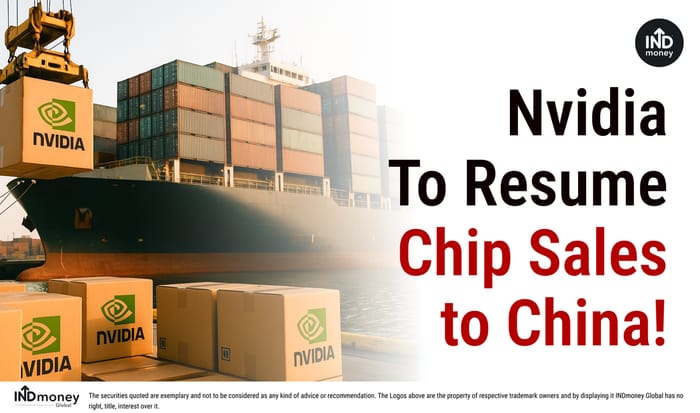
- Nvidia’s AI Chips Head Back to China As US Eases Export Curbs
- What are Nvidia’s H100, H20 AI Chips?
- What Nvidia CEO Jensen Huang said about the export ban lift
- What do Chinese Exports mean for Nvidia?
- What Lies Ahead for Nvidia After China Export Relief?
Nvidia has confirmed that it would resume sales of its H20 AI chips to China after a U.S. export ban had halted shipments. This development comes just after the company achieved a historic milestone, becoming the first publicly traded firm to cross a $4 trillion market valuation.
Let us break down how Nvidia has been the center of a geopolitical tug-of-war between the U.S. and China lately and what this new development with regards to China exports mean for the AI chip company.
Nvidia’s AI Chips Head Back to China As US Eases Export Curbs
The Donald Trump Administration had initially imposed an export ban on advanced AI chips to China, citing national security concerns. This directly impacted Nvidia's ability to sell its high-performance processors, including the H100, to a significant market. In response, Nvidia developed the H20, a modified version of its advanced AI chip designed to comply with U.S. export regulations.
However, even the H20 faced restrictions as it required a special license for export to China. In a recent turn of events, the U.S. has lifted the export ban on Nvidia's advanced AI chips to China. Nvidia has confirmed it is filing applications to sell the H20 GPU again, with the U.S. government assuring that licenses will be granted.
What are Nvidia’s H100, H20 AI Chips?
Nvidia’s H100 and H20 AI chips are high‑performance GPUs built to power advanced artificial intelligence workloads. The H100, is a flagship AI accelerator used for training and running large language models (LLMs), data analytics, and high‑end computing. The H20 is a modified version of the H100.
Let’s understand what Nvidia's AI chips like the H100 and H20 do. Imagine a massive, fancy Indian wedding feast being prepared.
- The H100 Chip: This is like having a team of the most renowned, experienced chefs in India, each a master of their craft. They can create the most complex, exquisite dishes with incredible speed and precision. They can handle any request, no matter how demanding, and the quality is unparalleled. This is the top-of-the-line chip, capable of handling the most demanding AI tasks.
- The H20 Chip: Now, imagine a team of very skilled and talented chefs who are just as capable but are given a slightly more restricted set of ingredients and recipes to work with. They can still produce an amazing feast, but with limitations. This is the H20, a powerful AI chip, but with its capabilities curtailed to comply with export regulations.
What Nvidia CEO Jensen Huang said about the export ban lift
Jensen Huang has been vocal about the impact of these export controls. He has repeatedly emphasized that China is a crucial market for the company and the broader tech industry. Recently, he met with officials in both Washington D.C. and Beijing to discuss the future of AI and the importance of open trade.
The billionaire even met Chinese government and industry officials to discuss how AI can raise productivity and ways to advance research safely. Huang has argued that the export ban was "clearly wrong," noting that China's AI ambitions would progress with or without U.S. chips due to its vast pool of AI talent.
What do Chinese Exports mean for Nvidia?
China is a significant market for Nvidia, and the export ban had a considerable financial impact. The company had projected a potential loss of $5.5 billion in revenue if the ban on the H20 chip remained in place.
In the first quarter of 2025, Nvidia reported a $4.5 billion charge related to excess inventory of the H20 chip due to the diminished demand caused by the export restrictions. The company also estimated it could have recorded an additional $2.5 billion in sales without the export restrictions.
What Lies Ahead for Nvidia After China Export Relief?
The lifting of the export ban provides a much-needed boost to Nvidia's operations in China. In its first quarter of fiscal 2025, Nvidia reported staggering revenue of $26 billion, a 427% increase from the previous year. It has provided robust guidance, forecasting revenues of $28 billion for the second quarter, signaling powerful demand for its products.
This momentum is set to continue with the launch of its next-generation "Blackwell" platform, which is already in full-scale production and expected to fuel the next wave of AI development. While navigating the complexities of the US-China relationship will remain a critical challenge, the global demand for AI infrastructure is a powerful tailwind that, for now, is proving more than capable of propelling Nvidia forward.
Disclaimer:
The content is meant for education and general information purposes only. Investments in the securities market are subject to market risks, read all the related documents carefully before investing. Past performance is not indicative of future returns. The securities are quoted as an example and not as a recommendation. This in no way is to be construed as financial advice or a recommendation to invest in any specific stock or financial instrument. The Company strongly encourages its users/viewers to conduct their own research, and consult with a registered financial advisor before making any investment decisions. All disputes in relation to the content would not have access to an exchange investor redressal forum or arbitration mechanism. Registered office address: Office No. 507, 5th Floor, Pragya II, Block 15-C1, Zone-1, Road No. 11, Processing Area, GIFT SEZ, GIFT City, Gandhinagar – 382355. IFSCA Broker-Dealer Registration No. IFSC/BD/2023-24/0016, IFSCA DP Reg No: IFSC/DP/2023-24/010.